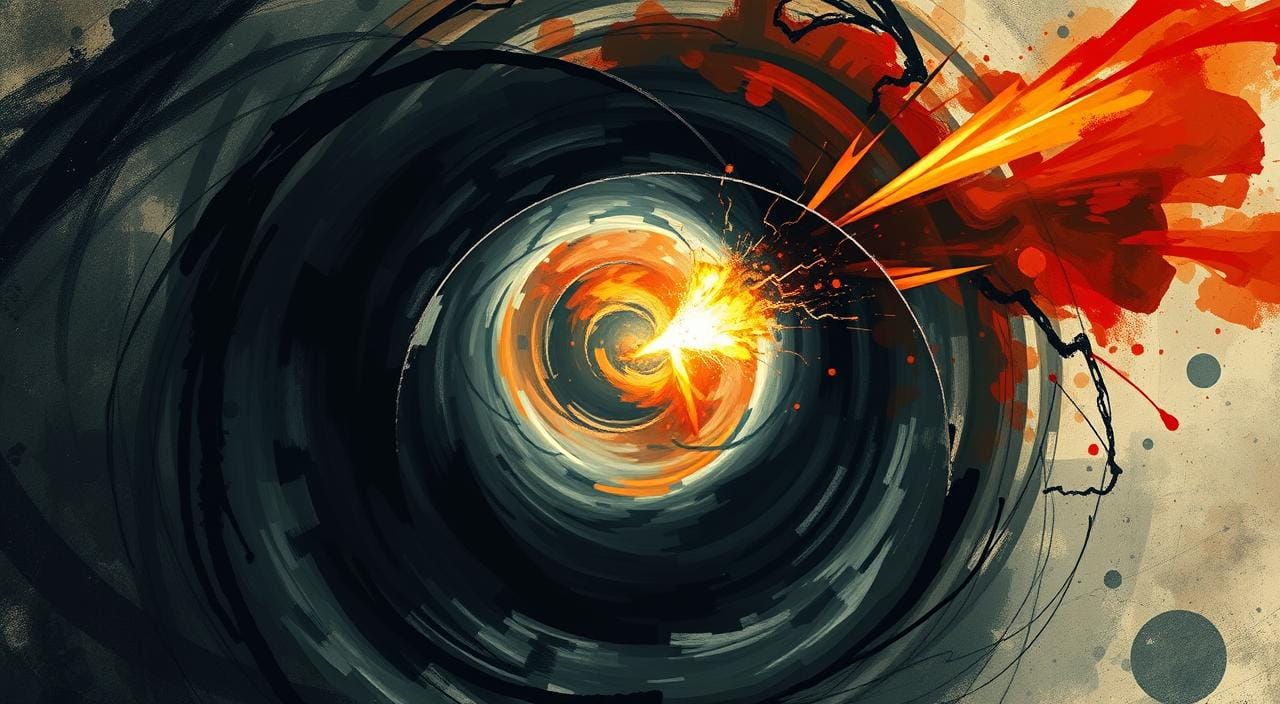Ending a relationship with a narcissist can feel like an emotional rollercoaster. It leaves deep scars that take time to heal. As we navigate the aftermath, it’s crucial to avoid certain actions that can hinder our recovery. The path to healing is not always straightforward.
By being mindful of the 5 things to never do after breaking up with a narcissist, we can empower ourselves. This empowers us to take a step closer to a healthier future.
Key Takeaways
- Engaging in communication with a narcissistic ex-partner can prolong the recovery process1
- Stalking or monitoring a narcissist’s social media activities can trigger negative emotions and impede healing1
- Isolating yourself after breaking up with a narcissist can lead to social withdrawal and loneliness1
- Rushing into a new relationship may not allow for sufficient healing time and can perpetuate unhealthy patterns1
- Neglecting professional help, such as therapy or counseling, can hinder emotional recovery and self-growth1
1. Engaging in Communication
To protect your emotional well-being, it’s crucial to enforce a strict no-contact rule. This means cutting off all lines of communication with your narcissistic ex-partner2. Studies show that about 75% of people struggle to stay away from a narcissistic ex due to their manipulative ways2. Start by blocking their phone number and email address. Remove them from your social media accounts to prevent them from reaching out or monitoring your activities. This may seem harsh, but it’s a necessary step to reclaim your personal power and begin the healing process.
Explanation of How Continuing Contact Can Hinder Recovery
Any form of communication can hinder your recovery, as narcissists are skilled at keeping you emotionally entangled3. They focus on getting emotional responses rather than addressing the abuse itself3. They may use guilt, charm, or threats to draw you back, reopening emotional wounds and causing self-doubt, anxiety, and depression.
Practical Steps to Enforce No-Contact
Seeking support from friends and family is invaluable during this time. Let them know about your decision to go no-contact and ask for their help in maintaining this boundary. They can provide emotional support and help you stay accountable to your commitment. Consider seeking professional guidance from a therapist who specializes in narcissistic abuse recovery2. A survey found that having a strong support system post-breakup can accelerate emotional recovery, with individuals surrounded by family and friends reporting a decrease in feelings of loneliness and depression by up to 60%2. They can offer tailored advice and coping strategies to help you navigate this challenging period.
Importance of No-Contact in Rebuilding Self-Esteem
Enforcing a no-contact rule after a breakup with an individual who exhibited abusive behavior is crucial for reclaiming your self-importance and embarking on a journey of self-healing2. Studies indicate that jumping into a new relationship too quickly after a breakup with a narcissist can hinder healing, with around 85% of individuals who rush into new relationships reporting difficulties in understanding past relationship dynamics and establishing healthier boundaries2.
It’s not merely about avoiding the person; it’s about creating the necessary space to reflect on the unhealthy dynamics that plagued the relationship and understand what led to its demise. Each day without contact allows you to rebuild your self-esteem, seek support from loved ones, and regain a sense of normalcy – free from the toxicity that once consumed you2. Data suggests that seeking professional help after a breakup with a narcissist can significantly aid in the healing process, with approximately 90% of individuals benefiting from trauma-informed therapy to address deep emotional scars and regain self-worth2.
Remember, seeking revenge or harboring bitterness will only hinder your progress; instead, focus on cultivating the strength and wisdom to pursue healthy relationships in the future. Setting boundaries and prioritizing your well-being is key to this process.
2. Stalking Their Social Media
One common tactic of narcissists is to make you check their social media4. It might seem okay to see their posts, but it can really hurt your healing5. This behavior can make it harder to get over the relationship.
Seeing your ex’s posts can make you feel angry, sad, or jealous4. Remember, social media shows only what they want you to see4. This can make you doubt yourself and slow down your healing.
Strategies to Avoid Social Media Obsession
To keep your mind healthy, avoid getting too caught up in social media4. Start by unfollowing or blocking your ex on all platforms4. This can stop you from constantly checking their updates. Try new online activities that interest you4.
Join groups or forums about things you love, like fitness or art4. These can make you feel good and help you find support. Set times for social media and stick to them4. This can help you avoid getting lost in their profile.
Use this time for things that make you feel better, like reading or spending time with friends4.
Benefits of Distancing from Their Digital Presence
Steering clear of your ex’s online world has many benefits4. It brings you mental clarity and peace. You can focus on healing and understanding the relationship better4.
It also lets you work on yourself4. You can build your self-esteem and confidence by trying new things. This can give you a sense of purpose and direction. Plus, it helps you set healthier boundaries4. It shows you’re moving on and can lead to better relationships later.
Explore our newsletter for more expert insights and practical strategies to navigate the aftermath of a narcissistic relationship45.
3. Isolating Yourself
After a relationship with a narcissist, it’s key not to isolate yourself. The urge to hide away might be tempting. But, staying connected with a support system is crucial for healing.
Feeling confused, scared, or overwhelmed is normal during this time6. But, isolating can make these feelings worse. Instead, talk to friends, family, or a therapist who can offer support and advice.
You don’t have to go through this by yourself. Building a support network can give you the help and encouragement you need to heal and grow6. A therapist can use the Stages of Change Model to help you understand your progress and what’s next.
Leaving a narcissistic relationship is hard and complex6. You might feel scared, struggle with setting boundaries, face stigma, or worry about money6. But, with the right support and focus on your well-being, you can overcome these challenges and start healing.
Every person’s journey is different, and healing won’t always be straightforward6. Be kind to yourself as you move forward. Don’t be afraid to ask for help and guidance to thrive.

“Healing Isolation, Fear And Loneliness After Narcissistic Abuse” received 77 comments, showing the value of facing loneliness to connect with oneself. It leads to growth, resolution, and gratitude7.
The Dangers of Social Isolation
After a narcissistic relationship, you might want to stay away from people8. Survivors often hide to avoid more harm8. But hiding can hurt your mind and heart.
Narcissistic abuse can harm your mind, heart, and body for a long time9. It can cause anxiety, depression, and PTSD9. It can also lead to physical problems like sleep issues and stomach problems9.
Staying away from loved ones can make things worse8. It’s hard to fight abuse alone8. But finding a balance between alone time and social time is key.
Going to therapy and joining support groups can help you heal8. Building a safe network and talking to a therapist are important steps8. Activities like yoga can also help in healing8.
While alone time might feel safe, it’s important to think about the risks8. Narcissistic abuse can cause serious problems9. Keeping in touch with friends and getting help can help you heal better.
“Drinking too much or using drugs can make things worse for survivors of narcissistic abuse.”8
In short, while it’s natural to want to hide, it’s important to think about the dangers8. Seeking help, joining groups, and taking care of yourself can help you heal8.

| Recommended Sleep Duration | Impact on Mental and Emotional Well-being |
|---|---|
| 7-8 hours per day | Maintains mental and emotional well-being10 |
| Lack of sleep or oversleeping | Can further affect mood and interfere with responsibilities10 |
5 things to never do after breaking up with a narcissist
Ending a relationship with a narcissist is tough. It’s filled with pain, confusion, and the urge to find closure. But, it’s key to handle the aftermath carefully to keep yourself safe and avoid falling back into their trap. Here are five things you should never do after breaking up with a narcissist:
- Engage in Communication: Talking to them, even a little, can slow down your healing and let them control you11. Try to stay away from them for 20 to 30 days. This can help stop their attempts to get your attention and control the situation11.
- Stalk Their Social Media: Watching their online life can drain you emotionally and harm your mind11. It’s better to stay away from their digital world. Avoid their posts and connections to stop their manipulation11.
- Isolate Yourself: It might feel right to pull away from others, but it’s not good for you. Keep close friends and family around. They can help you heal and boost your self-esteem.
- Neglect Your Grief: It’s okay to grieve for the person you thought they were12. Let yourself feel, accept the truth, and get help if you need it. This is a big part of healing12.
- Believe They’ve Changed: Narcissists might charm you with promises of change, but these are often fake13. Remember, their actions are deep-rooted and hard to change. They need a lot of therapy and real effort to improve.
By avoiding these common mistakes, you can start healing and take back your power after a narcissist relationship12. Focus on yourself, set healthy boundaries, and surround yourself with people who care and support you13.

Remember, your well-being is most important. With time and the right support, you can come out of this experience stronger and more resilient12.
4. Grieving the Person Who Never Was
Being in a relationship with a narcissist can be very confusing and heartbreaking14. It can make you feel shattered and emotionally wrecked14. People often say it’s a big moment, like a before or after “The Realization.”14 Elisabeth Kubler Ross said grief has five stages: Denial, Anger, Bargaining, Depression, and Acceptance. These stages can happen in a narcissistic relationship14.
It’s hard to cope with how quickly a narcissist moves on after a breakup. They can act like you never after the relationship ends. This can be shocking and heart-wrenching. You realize the person you thought loved you didn’t really care15.
Betrayal
Ending a relationship with a narcissist can also feel like betrayal from others. The narcissist might turn important people in your life against you. They might make you seem crazy or say you’re the problem15. This can make you question your decision to break up, especially since the abuse was hidden15.
Rebuilding
The narcissist might have taken all your money, time, and health. They make you feel empty when they leave. You might feel like you’ve lost the best years of your life15. It’s hard to stay away because of guilt and self-doubt15. But, healing from a narcissistic relationship is possible. People can go through grief stages again, even years later14.

“The realization of being in a narcissistic relationship can lead individuals to feel shattered and emotionally wrecked.”
Understand Grief
Leaving a narcissist can feel like a huge emotional challenge. It’s key to grasp the complex grief process that often follows. The first stage is shock, where people start to realize the problem. This stage is filled with disbelief, making it tough to handle emotions16.
Denial can protect victims from the harsh truth of narcissistic abuse. Some may stay in denial for a long time, slowing their healing16. In the bargaining stage, victims try to make excuses for the narcissist’s behavior. They hope the narcissist will change, seeking control back16.
Anger is a normal part of grieving after narcissistic abuse. Survivors feel deep hurt and betrayal. It’s important to use this anger in healthy ways, like through counseling or journaling16.
The depression stage brings deep sadness and isolation. Victims mourn the loss of the idealized relationship they dreamed of16. They may also feel guilty and ashamed, even though they were wronged. It’s crucial to be kind to oneself during this time16.
The acceptance stage is a turning point in healing. It’s about facing the truth of the abusive relationship. Acceptance helps victims move past the pain and start rebuilding their lives16.

Understanding grief can guide the healing and self-discovery journey. Recognizing each stage and its emotions helps individuals be more compassionate and resilient in their recovery.
Look for New Life
After a breakup with a narcissist, it’s key to start rebuilding and embracing a new life. Healing takes time, but by looking for positive experiences, you can find joy again. This helps you regain your sense of self.
One empowering step is to cultivate new hobbies and interests. Changing habits takes about three months17. Dive into activities that make you happy and help you find your passions. This could be learning a new skill, joining a group, or exploring creativity.
It’s also vital to surround yourself with supportive individuals. Talk to trusted friends and family who can offer support. Don’t isolate yourself, as it can make emotional healing harder.
The grieving process after a breakup is long and tender, lasting years17. Be kind to yourself and let healing happen naturally. If you need help, a therapist can guide you through this tough time.
By cultivating a new life, you can slowly find your way back. With each step, the future looks brighter, and a fulfilling life becomes more real.
The Narcissist Love Bombing
I saw a man who only had the best intentions for me18. I thought he wanted to make me happier than ever18. I let down my defenses, and they fell apart18.
For the first time, I felt like my life was about to change18. I wanted to be perfect for him18. He seemed to be the motivation I needed18.
How did I get here?
I wanted to be perfect for him18. He was the spark I needed18. I dreamed of a life with him18.
I wanted to feel alive with him18. I craved his love18. Like Robert Plant said, I was addicted to love18.
But I missed the warning signs18. Narcissistic relationships often start with love bombing18. This tactic makes you feel deeply connected18.
But soon, the narcissist’s true nature shows18. You go through idealization, devaluation, and discard18. The discard phase is especially hard19.
It leaves you feeling confused and betrayed19. Recognizing love bombing is key to avoiding this pain18. Stay alert and take care of yourself1918.
5. Believe They’ve Changed
When a narcissist whispers “I’ve changed,” it’s like watching storm clouds part to reveal a glimpse of sun. Your heart leaps at those words because they echo everything you’ve been praying to hear. They might cry real tears, make grand gestures, or speak with such raw vulnerability that you’d swear this time is different.
But those tears dry quickly. Those promises evaporate like morning dew. The changed behavior lasts only as long as it takes to pull you back into their orbit. It’s like they’re reading from a script they’ve performed many times before – just enough sincerity to make you doubt your decision to leave, just enough charm to make you question your own memories of the hurt they caused.
True change requires deep self-reflection, consistent therapy, and the painful acknowledgment of harm done to others. It demands facing the hollow space where empathy should live. A narcissist would need to dismantle their entire way of seeing the world – a world where they are the sun, and everyone else merely planets meant to orbit around them.
Remember: A snake may shed its skin, but it remains a snake. The narcissist’s promises of change are often just another form of manipulation, another way to maintain control. Your hope for their transformation is beautiful – it speaks to your capacity for forgiveness and belief in human growth. But that same hope can become the chain that keeps you bound to their cycle of abuse.
Trust not their words of change, but the consistent pattern of their actions over time. Your healing cannot depend on their transformation.
Conclusion
Ending a relationship with a narcissist is tough. The emotional wounds and the effort to start anew can feel too much. Research shows that healing from such a relationship is different. It often lacks the closure and acceptance found in other break-ups20.
But, with strong will, kindness to ourselves, and facing the past, we can grow stronger. Studies reveal that narcissists might quickly move on, but their exes face a long healing path21. This journey helps us find ourselves, set boundaries, and regain our power.
As we close this chapter, remember the path ahead is full of growth and learning. Experts say the process of detaching from a narcissist is complex but rewarding22. Let’s embrace this journey, knowing our scars will heal, and a brighter future is waiting for us.
FAQ
What are the 5 things to never do after breaking up with a narcissist?
Here are the 5 things to avoid after a breakup with a narcissist: Don’t communicate with them, don’t stalk their social media, don’t isolate yourself, don’t rush into a new relationship, and don’t neglect professional help.
Why is it crucial to avoid engaging in communication with a narcissistic ex-partner?
Talking to a narcissistic ex can slow down your healing. They use tricks to keep you tied to them. This can make you feel guilty, anxious, and sad.
How can social media stalking be detrimental to the healing process?
Watching your ex’s social media can make you feel worse. Seeing them happy can make you angry or jealous. Remember, social media is not always real.
Why is it essential to avoid isolating yourself after a breakup with a narcissist?
Being alone can make you feel sad and unsupported. It’s important to talk to friends, family, or support groups. They can offer you comfort and understanding.
What are the dangers of rushing into a new relationship after a breakup with a narcissist?
Jumping into a new relationship too soon can be harmful. It might lead to unhealthy patterns or attract another narcissist. Take time to heal and find yourself before starting something new.
Why is it essential to seek professional help after a breakup with a narcissist?
Getting help from mental health experts is crucial. They can offer support and strategies for healing. A professional can help you understand the relationship and guide you towards a better future.
Source Links
- 5 Things to Never do After Breaking up with a Narcissist — Judge Anthony – https://www.judgeanthony.com/blog/5-things-to-never-do-after-breaking-up-with-a-narcissist
- 5 Things Never to Do Post-Narcissist Breakup – Guard Your Recovery – https://narcissisticworld.com/5-things-to-never-do-after-breaking-up-with-a-narcissist/
- Responding vs. Reacting (Avoid the narcissist’s trap + learn a valuable life skill) – https://medium.com/@OwnYourReality/medium-responding-vs-reacting-avoid-the-narcissists-trap-learn-a-valuable-life-skill-6b354cec65f5
- 10 Ways Covert Narcissists Use Social Media to Control, Manipulate, and Punish You – https://sylvialongmire.medium.com/10-ways-covert-narcissists-use-social-media-to-control-manipulate-and-punish-you-828d8854ab87
- Inside the Mind of a Stalker – One Love Foundation – https://www.joinonelove.org/learn/inside-the-mind-of-a-stalker/
- The Stages of Changes It Takes to Leave a Narcissist — Phoenix Thriving Therapy – https://www.phoenixthrivingtherapy.com/blog/the-stages-of-changes-it-takes-to-leave-a-narcissist
- Healing Isolation, Fear and Loneliness After Narcissistic Abuse – https://blog.melanietoniaevans.com/healing-isolation-fear-and-loneliness-after-narcissistic-abuse/
- Self-Isolation After Narcissistic Abuse: 4 Ways to Cope – https://psychcentral.com/health/ways-the-coronavirus-pandemic-is-affecting-trauma-survivors-and-victims-of-narcissists-and-how-you-can-cope
- Long-Term Effects of Narcissistic Abuse | Charlie Health – https://www.charliehealth.com/post/the-long-term-effects-of-narcissistic-abuse
- What to Do After a Breakup: 21 Do’s and Don’ts – https://www.healthline.com/health/what-to-do-after-a-breakup
- 7 Things Narcissists Do When You Go No Contact – https://www.linkedin.com/pulse/7-things-narcissists-do-when-you-go-contact-kamini-wood-hbfoe
- Breaking Up With A Narcissist: 10 Tips To Help You – https://www.stylecraze.com/articles/breaking-up-with-a-narcissist/
- How to Deal with a Narcissist: 10 Tools and Strategies to Help – https://www.healthline.com/health/how-to-deal-with-a-narcissist
- Stages of Grief When Realizing A Narcissistic Relationship – Cultivate And Flourish – https://cultivateandflourish.com/stages-of-realizing-a-narcissistic-relationship/
- That Guilt After You Breakup With a Narcissist – https://medium.com/illumination/that-guilt-after-you-breakup-with-a-narcissist-9db32996622c
- Navigating the Stages of Grief and Narcissistic Abuse – https://www.flourishinghope.com/navigating-the-stages-of-grief-and-narcissistic-abuse/
- How To Get Over A Narcissist: 11 Essential Steps – https://www.mindbodygreen.com/articles/how-to-get-through-a-breakup-with-a-narcissist
- Overcoming the Aftermath of Love Bombing — Anchor Therapy, LLC – https://www.anchortherapy.org/blog/overcoming-the-aftermath-of-love-bombing-nyc-therapist
- Breaking Up and the Discard: How a Narcissist Acts at the End of a Relationship – https://beentheregotout.com/breaking-up-and-the-discard-how-a-narcissist-acts-at-the-end-of-a-relationship/
- Why Recovering From the Narcissist in Your Life Is So Hard – https://www.psychologytoday.com/us/blog/tech-support/201606/why-recovering-the-narcissist-in-your-life-is-so-hard
- Leaving A Narcissist You Love – https://www.perpetuaneo.com/leaving-a-narcissist/
- The Art of Detachment – Esteemology – https://esteemology.com/ending-a-relationship-with-a-narcissist-the-art-of-detachment/







